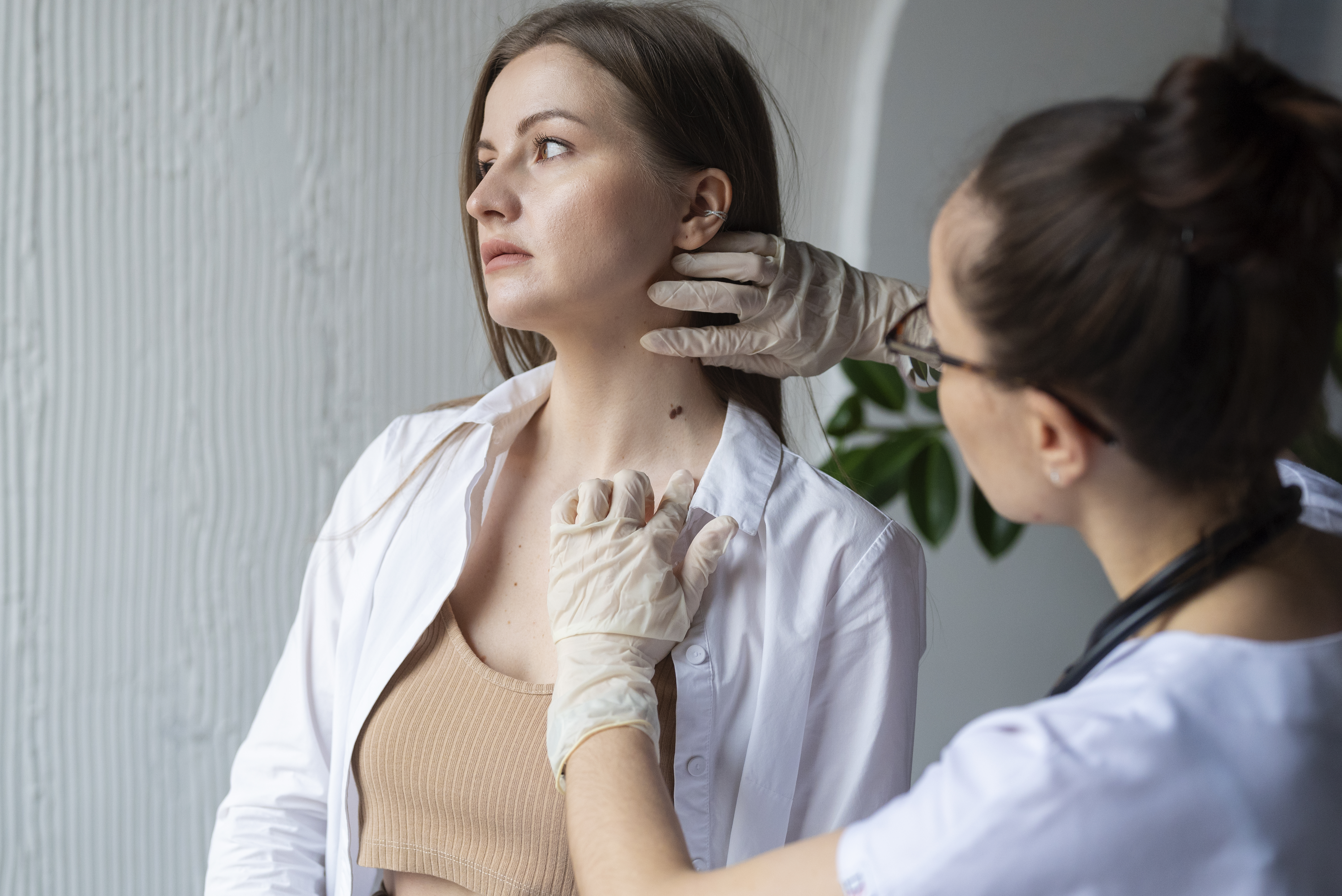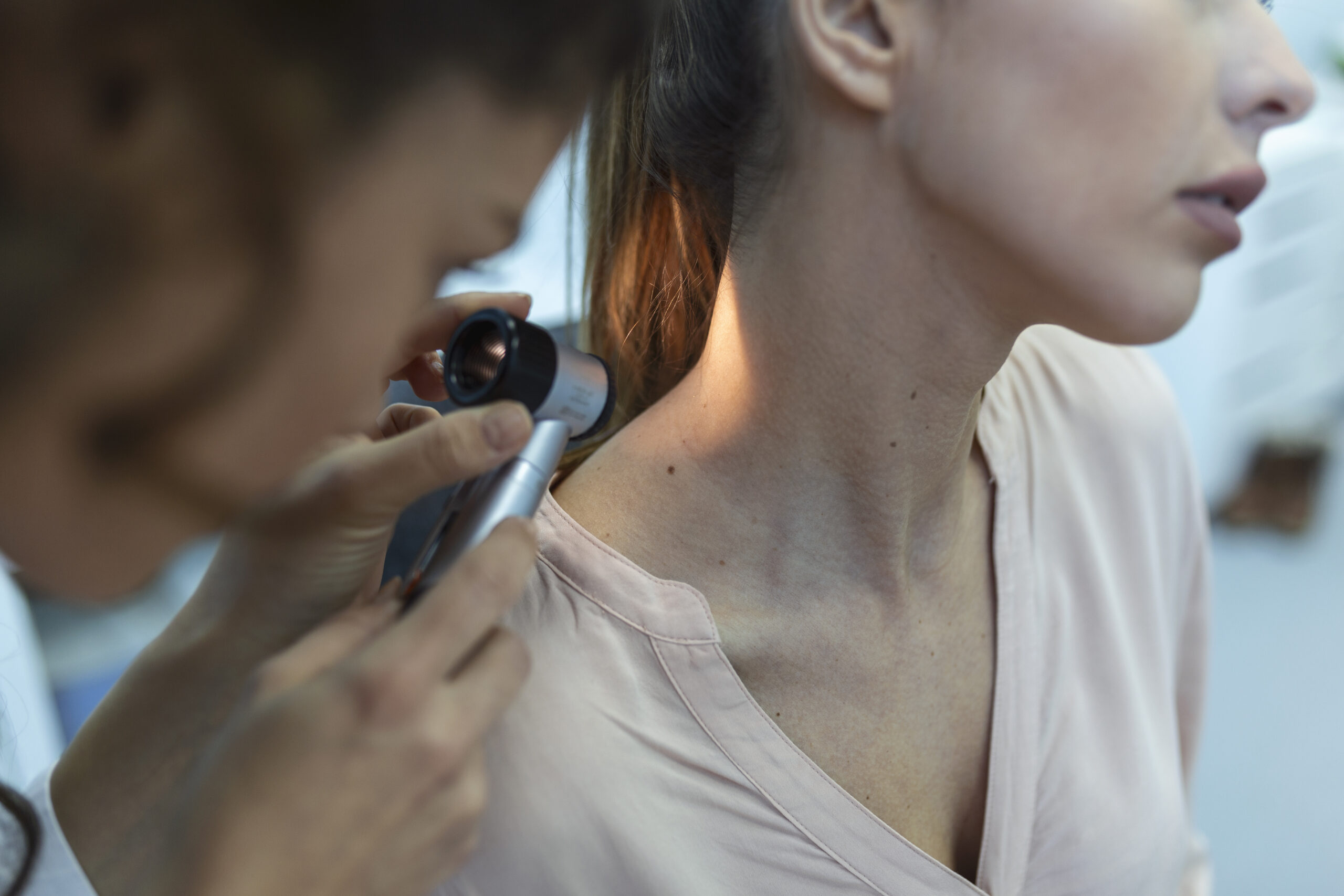A dermatologist is a medical professional who specializes in treating skin, hair, and nail diseases. The dermatologist's role is to assess whether any changes are a defect of the skin itself or a symptom of other internal diseases.

Diseases treated by a dermatologist![]() include:
include:
Check-ups of all moles on the body should be performed once a year from the age of 15, especially in people at risk of melanoma, such as:
In some situations, it is recommended that inspections be performed more frequently, every 3-6 months. Particular attention should be paid to new moles or warts and when existing moles change in size, color, or shape.
The most common symptoms of skin diseases are skin eruptions![]() . It is a diverse group of symptoms that allow for diagnostics and differentiation of dermatological diseases. Skin eruptions include:
. It is a diverse group of symptoms that allow for diagnostics and differentiation of dermatological diseases. Skin eruptions include:
Itching is a common symptom of skin diseases and can be caused by various factors. It generally occurs due to the action of harmless and eliminated irritants.
Dermatological consultation is also recommended in case of hair and nail problems![]() . These may include:
. These may include:
Detailed diagnosis of the disease is necessary to implement appropriate treatment. During a medical consultation, the dermatologist interviews the patient and examines![]() their skin, appendages, and mucous membranes.
their skin, appendages, and mucous membranes.
If necessary, perform tests, including:
Sometimes, in-depth diagnostics is necessary to determine the causes of skin lesions. Based on the medical interview, the dermatologist may order other tests, including:

Choosing the right dermatology specialist can be crucial to maintaining the health and beauty of your skin. A dermatologist diagnoses and manages skin, hair, and nail conditions.
It is worth seeking the opinions of other patients about a given dermatologist. You can do this by talking to people who have used this doctor's services or reading reviews on the Internet. Please do not base your judgment exclusively on comments online, as they are not always objective.
Let's consider what qualifications a dermatologist should have. Large cities offer a wide selection of specialists, but it is worth examining the doctor's education closely. A dermatologist is a person who has completed the next stage of medical education, i.e., specialization.
You can also recognize a good dermatologist by taking additional courses in dermatology, such as those related to the treatment of specific diseases, such as atopic dermatitis, infectious diseases, or seborrheic dermatitis.
A dermatologist may have additional specializations. It is important when choosing the proper doctor. A venereological dermatologist diagnoses and treats sexually transmitted diseases. It will help with parasitic diseases, warts, and infections – fungal and bacterial.
A pediatric dermatologist treats diseases in children and adolescents. Dermatological examinations and treatments are adjusted to the patient's age. A dermatosurgeon, to whom we refer when we have disturbing moles, is another specialization.
If a dermatologist completes additional courses, they can become an aesthetic medicine doctor or a trichological dermatologist. The last one is worth attending if you have scalp problems, hair loss, thinning, or brittleness.
To sum up, choosing a good dermatologist requires first checking their qualifications and professional experience. Read other patients' opinions and ensure that a given specialist offers a wide range of services and is easily accessible to their patients.
Appropriate preparation for a visit to a dermatologist can help the doctor make a diagnosis and, above all, speed it up. Informing the dermatologist about our health condition and symptoms will make it easier to determine the cause of our skin problems.
Before your appointment, consider the main reasons for your visit. Describe your symptoms to help the dermatologist fully understand your concerns.
Wear loose-fitting and comfortable articles of clothing that permit easy examination of the places you want the specialist to examine. Depending on the circumstances, this can mean shorts for a leg examination or a loose shirt for a back examination.
If you wear makeup to conceal facial blemishes, consider removing it before the visit so the doctor can see your skin. If you're uncomfortable being without makeup, you can remove it in the office, in the doctor's presence, and reapply it after the visit.
Avoid doing a manicure or pedicure before your visit, as the doctor may need to examine your natural nails for diagnostic purposes.
Continue your current treatment and provide the details to your new dermatologist during the visit. Explain how the therapy impacts you and if you've glimpsed any side effects. This notification will help the specialists evaluate your current treatment and make any necessary adjustments.
Please inform your doctor of any other medical conditions you may have. Before your appointment, it's a great idea to jot down all your illnesses and allergies. It is worth remembering how long you have been sick and informing your doctor whether the disease is being treated, whether it is progressing, and in what situations exacerbations of symptoms occur. Even if, in the context of the skin disease you are reporting to a dermatologist, one of the conditions seems irrelevant to you, it is essential to mention it. It may have a powerful influence on the diagnostic process.

The dermatologist will ask straightforward questions about the symptoms, including when they began, if they've worsened or enhanced, and any elements that seem to activate or relieve them. Be genuine and sincere about the symptoms, even if they seem uncomfortable.
If you have had blood tests in the last three months, take the results. Except for basic morphology, it is not worth performing tests on your own – it may turn out that you will spend money unnecessarily, and the doctor will order completely different tests. If you have documentation describing past or present diseases and previous surgeries and procedures, take them with you, even if they seem unrelated to the current problem. It's always better to give your doctor too much information than too little.
Specialists use their skills and years of education to help patients by obtaining the proper diagnosis and creating the optimal treatment plan. But at the end of the day, doctors are human and can make mistakes or not give as precise of a diagnosis as the patient may want. Ask clarifying questions and give supplementary information you consider helpful. If you need to, get a second opinion.
Treatments can range from simple procedures to more advanced techniques. The main methods and procedures used in dermatology include: